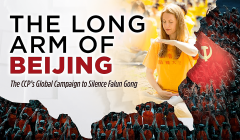The New Statesman: Being a Falun Gong practitioner
An Excerpt
Often in the news but rarely understood, Falun Gong is regularly associated with Chinese human rights issues. Leeshai Lemish gives his understanding of what Falun Gong practitioners actually believe
I would have laughed if ten years ago you told me that my search for a meditation practice would land me on Beijing’s blacklist.
At that time I was an athlete with more determination than talent. My fascination with the mental side of sports and venture into alternative treatments for a back injury lead me to visualisation techniques, yoga, and tai chi. My quest then turned to Buddhist practices – a Vipassana retreat here, sessions at a Zen centre there.
Falun Dafa, or Falun Gong, was among the disciplines I experimented with but initially put aside. While I appreciated Falun Gong’s holistic system for mind and body, friendly and outgoing practitioners, and always free teachings, I also found the emphasis on discarding all attachments too demanding; some attachments I still wanted to keep. I’ll get back to this later, I thought, after I’ve had my fun.
A mundane incident brought me back to Falun Dafa. One evening I was arguing heatedly with my father. I suggested we take a break. Sitting on the floor, I tried coaching myself into a better state of mind: ‘Ok, what should I do? Well, this Falun Dafa book here says we should act with truthfulness, compassion, and tolerance. I might be acting truthfully, but I’m not being very tolerant or compassionate. I’ll try keeping these principles in mind’. I returned to the kitchen and within a minute we were hugging. Soon after, I went online and found the local Falun Dafa volunteer.
Daily Cultivation
Not long before, I applied for ordination at a remote Buddhist temple. Instead, with Falun Dafa I found a way to bring a monk’s sacred commitment to spiritual perfection to daily life in the secular world.
This balancing act is both challenging and rewarding. All the things we are deeply attached to – what we desire and what upsets us – are right before us. From nude advertisements to obnoxious colleagues – daily tests pop up to see whether we can sever the strings of attachments and emotions that tug at our hearts. While maintaining a job and raising a family, we seek to abandon selfishness and orient our hearts toward a greater good. We try to embrace hardships that come along as opportunities for spiritual growth.
Normally (as before persecution began in China), there are only two obvious differences between the lives of Falun Gong practitioners and others.
First, we perform four exercises, which resemble tai chi, and a meditation. When I manage to get up in the morning to exercise I feel lighter, energized, and more clearheaded.
As in Chinese medicine, we believe the body’s energy can be refined and transformed in ways that cannot be seen. Like heat, however, the effect is often palpable.
Second, we regularly study the teachings of Master Li Hongzhi, Falun Dafa’s founder. We might read a chapter during lunch break or listen to a talk on our iPods on the Tube. Sometimes, we’ll meet to exchange understandings of the teachings and how we apply them to our daily lives, taking joy in enlightening to new spiritual insights.
Path of Return
As I understand them, these teachings remind us to ‘look inside’ and find our own shortcomings instead of blaming others. They also remind us of life’s transience, cause and effect relationships, and our ultimate goal of enlightenment.
Cosmologically, I would say we believe we humans have descended to the world from much purer realms. We can return to these heavens, the true homes of our souls, by elevating our moral characters through a process we call ‘self-cultivation’ (xiu-lian). We do this by striving to follow the principles of truthfulness, compassion, and tolerance (zhen-shan-ren). We hold these to be the underlying characteristics of the universe from which we have deviated out of selfishness.
Like Buddhists, we see suffering as basic to the human experience, a result of karma from previous wrongdoings in this life or before. We have no ordinances against taking medicine, nor are we discouraged from helping those in need. But we believe more permanent relief comes through spiritual elevation via self-cultivation.
[…]
Since most know Falun Gong through its human rights activism…, it’s easy to forget that this activism is something we’ve been begrudgingly forced into by persecution. At heart, we would much rather spend our Saturday mornings in the park, meditating quietly under a tree.
Complete article available at: http://www.newstatesman.com/blogs/the-faith-column/2008/08/falun-gong-dafa-rights-believe







